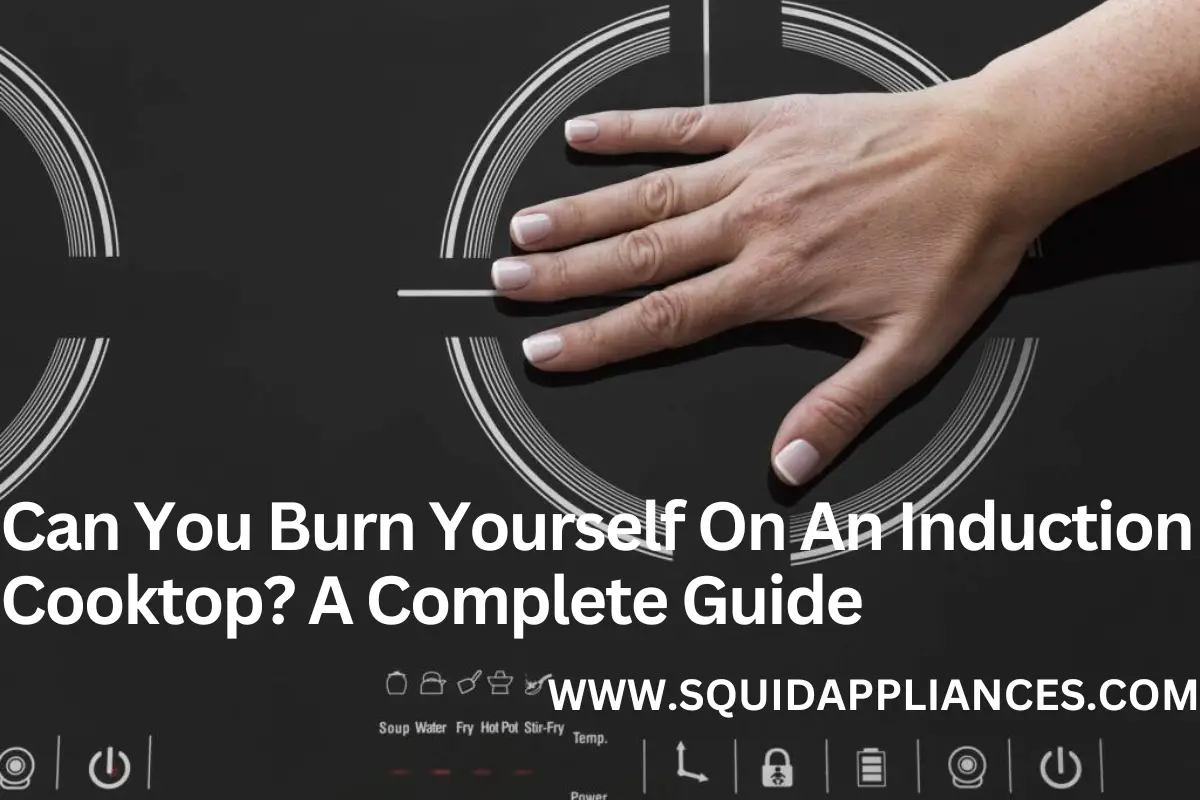Ever found yourself gingerly touching an induction cooktop, wondering if it’s hot enough to sear your skin? We’ve all been there. As a safety-focused cook, I understand the importance of knowing what can and can’t harm you in the kitchen.
That’s why I’ve put together this comprehensive guide on induction cooktops, specifically answering that burning question: Can you burn yourself on them?
Knowledge is power; let’s use it to keep our kitchens safe and burn-free!
Can You Burn Yourself on an Induction Cooktop?
You can burn yourself on an induction cooktop, but understanding their safety features and using proper cookware and precautions significantly reduces the risk. Induction cooktops heat pots directly, not the surface, for faster cooking and fewer burns. Safety features include automatic shut-off and childproofing. Always prioritize safety in the kitchen.
Key Takeaways
- Induction cooktops use magnetic fields to heat pots directly, resulting in faster cooking times and less risk of burns.
- Induction cooktops have built-in safety features such as only heating the pan, not the surface, and automatic shut-off when not in use.
- Cookware material safety is important to prevent burns, and pot holders or oven mitts should be used for handling.
- Constant exposure to magnetic fields may have health implications, and the long-term effects are still unknown.
Understanding Induction Cooking
Induction cooking isn’t as complex as it might seem, and understanding how it works can help you steer clear of any potential burns. It’s all about induction efficiency and the speed of cooking.
It uses magnetic fields to heat your pots directly instead of heating the cooktop surface. This means faster cooking times and less risk of accidental burns, but only if used correctly. Safety should always be a priority in any kitchen!
Safety Features of Induction Cooktops
Don’t let safety concerns rain on your culinary parade, as these modern stoves have a range of built-in features to keep accidents at bay.
- They only heat the pan, not the surface, reducing burn risks.
- Many include childproofing measures like lock controls.
- They turn off automatically when not in use.
- Their energy efficiency helps prevent overheating.
- Some models even have overflow detection that shuts it off if spills occur.
Potential Risks and Hazards
As we delve deeper into the safety aspects of induction cooktops, it’s essential to address potential risks and hazards that could arise.
One significant concern is the risk of burns from hot cookware, as although the induction cooktop itself doesn’t heat up, the transferred heat can make your pots and pans incredibly hot.
Furthermore, there have been some concerns about exposure to magnetic fields during usage which deserve our attention for a comprehensive understanding of safety measures.
Risk of Burns from Hot Cookware
You might be wondering if you can get burned from the pots and pans heated by induction cooktops, right? Well, it’s crucial to understand that although the induction surface stays cool.
- The cookware material safety matters as it gets hot and could cause burns.
- Use pot holders or oven mitts for handling.
- Burn treatment methods should be known in case of an accident.
- Always have a first aid kit handy.
Magnetic Field Concerns
It’s natural to question whether constant exposure to the magnetic fields generated by these cooking devices could pose a health risk. For instance, imagine routinely preparing your family meals on an induction stove, blissfully unaware of the invisible magnetic waves surrounding it.
| Electromagnetic Interference | Health Implications |
|---|---|
| Might affect pacemakers or other implanted devices. | Not proven but consistently studied for potential risks. |
| Can interfere with digital equipment. | Long-term effects still unknown. |
Practical Tips to Prevent Burns
Let’s dive right into some handy tips that’ll help you avoid any nasty burns while using an induction cooktop.
To ensure burn prevention, keep your hands off the cookware during cooking and always use heat-resistant gloves.
For child safety, lock the controls when not in use or consider getting a model with a child-safety feature.
Never leave hot pots unattended on the surface.
Safety first!
Comparing Induction Cooktops to Traditional Stoves
After discussing prevention tips, let’s compare induction cooktops to traditional stoves.
- Induction cooktops are safer; there’s less chance of accidental burns as they only heat the pan, not the surface.
They boast greater energy efficiency, using less electricity than conventional stoves.
Cost comparisons may favor traditional stoves initially, but long-term savings with induction make them an economical choice.
Remember, safety and efficiency should guide your kitchen choices.
Frequently Asked Questions
What types of cookware are suitable for induction cooktops?
Induction compatible materials like stainless steel, cast iron or magnetic-based pots work best on induction cooktops. The cookware’s quality impacts performance and safety, so always use durable, well-made pans.
How does the cost of induction cooktops compare to traditional stoves?
Digging into my wallet, I’ve found induction cooktops can be pricier initially due to installation expenses. However, when pitted against traditional stoves in a longevity comparison, they tend to have the upper hand financially.
Are induction cooktops energy efficient?
Yes, induction cooktops are energy efficient. Their efficiency ratings are high due to induction conservation technology, which only heats the pot and not the entire surface, providing safer and more economical cooking.
How do you clean an induction cooktop?
I clean my induction cooktop with mild cleaning products, ensuring it’s cool first. Regular maintenance is key, I do a thorough wipe down after every use to prevent build-up. Remember, safety always comes first!
Can all types of food be cooked on an induction cooktop?
Absolutely, all types of food can be cooked on an induction cooktop. Induction cooking speed is impressive and it’s great for food flavor retention. But remember, always use suitable cookware for safety reasons.
Conclusion
So, can you get scorched by an induction cooktop? Sure, if you decide to touch a hot pot or ignore safety features. But remember, it’s as likely as being abducted by aliens while doing your laundry!
With careful use and respect for this advanced technology, it’s easy to avoid burns. Induction cooktops are far safer than traditional stoves – they’re practically baby-proof!
Stay safe and enjoy the future of cooking with induction technology.






